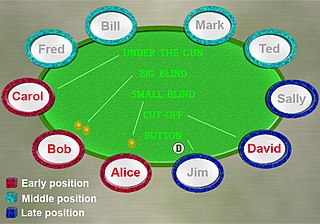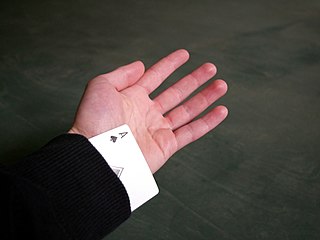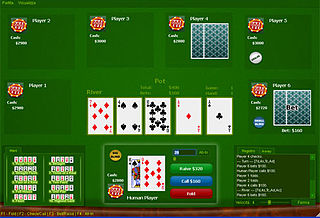
Games available in most casinos are commonly called casino games. In a casino game, the players gamble cash or casino chips on various possible random outcomes or combinations of outcomes. Casino games are also available in online casinos, where permitted by law. Casino games can also be played outside of casinos for entertainment purposes, like in parties or in school competitions, on machines that simulate gambling.

In the game of poker, the play largely centers on the act of betting, and as such, a protocol has been developed to speed up play, lessen confusion, and increase security while playing. Different games are played using different types of bets, and small variations in etiquette exist between cardrooms, but for the most part the following rules and protocol are observed by the majority of poker players.

Cheating in poker is any behavior outside the rules of poker that is intended to give an unfair advantage to one or more players.

A tell in poker is a change in a player's behavior or demeanor that is claimed by some to give clues to that player's assessment of their hand. A player gains an advantage if they observe and understand the meaning of another player's tell, particularly if the tell is unconscious and reliable. Sometimes a player may fake a tell, hoping to induce their opponents to make poor judgments in response to the false tell. More often, people try to avoid giving out a tell, by maintaining a poker face regardless of how strong or weak their hand is.

A poker tournament is a tournament where players compete by playing poker. It can feature as few as two players playing on a single table, and as many as tens of thousands of players playing on thousands of tables. The winner of the tournament is usually the person who wins every poker chip in the game and the others are awarded places based on the time of their elimination. To facilitate this, in most tournaments, blinds rise over the duration of the tournament. Unlike in a ring game, a player's chips in a tournament cannot be cashed out for money and serve only to determine the player's placing.
A computer poker player is a computer program designed to play the game of poker, against human opponents or other computer opponents. It is commonly referred to as pokerbot or just simply bot. As of 2019, computers can beat any human player in poker.

Online poker is the game of poker played over the Internet. It has been partly responsible for a huge increase in the number of poker players worldwide. Christiansen Capital Advisors stated online poker revenues grew from $82.7 million in 2001 to $2.4 billion in 2005, while a survey carried out by DrKW and Global Betting and Gaming Consultants asserted online poker revenues in 2004 were at $1.4 billion. In a testimony before the United States Senate regarding Internet Gaming, Grant Eve, a Certified Public Accountant representing the US Accounting Firm Joseph Eve, Certified Public Accountants, estimated that one in every four dollars gambled is gambled online.

Thuận B. "Scotty" Nguyễn is a Vietnamese-American professional poker player who is a five-time World Series of Poker (WSOP) bracelet winner, most notably as the winner of the 1998 World Series of Poker Main Event and the 2008 World Series of Poker $50,000 H.O.R.S.E. World Championship. He is the first and only player to win both the WSOP Main Event and $50,000 Players' Championship.
Super/System, one of the first books about poker strategy, was written and published in 1979 by Doyle Brunson, a professional poker player and multiple winner at the World Series of Poker.
A metagame, broadly defined as "a game beyond the game", typically refers to either of two concepts: a game which revolves around a core game; or the strategies and approaches to playing a game. A metagame can serve a broad range of purposes, and may be tied to the way a game relates to various aspects of life.
In poker, bad beat is a subjective term for a hand in which a player with what appear to be strong cards nevertheless loses. It most often occurs where one player bets the clearly stronger hand and their opponent makes a mathematically poor call that wins with any subsequent dealing to complete the hand.

Cash games, also sometimes referred to as ring games or live action games, are poker games played with "real" chips and money at stake, often with no predetermined end time, with players able to enter and leave as they see fit. In contrast, a poker tournament is played with tournament chips worth nothing outside the tournament, with a definite end condition, and a specific roster of competitors.
Poker tools are a variety of software or web-based applications that allow the statistical analysis of poker players, games or tournaments.
Advantage gambling, or advantage play, refers to legal methods used to gain an advantage while gambling, in contrast to cheating. The term usually refers to house-banked casino games, but can also refer to games played against other players, such as poker. Someone who practices advantage gambling is often referred to as an advantage player, or AP. Unlike cheating, which is by definition illegal, advantage play exploits innate characteristics of a particular game to give the player an advantage relative to the house or other players. While not illegal, advantage play may result in players being banned by certain casinos.

Thomas Dwan Jr. is an American professional poker player who played online in the highest-stakes No-Limit Texas hold 'em and Pot-Limit Omaha games, primarily on Full Tilt Poker under the screen name "durrrr". Dwan has won prize money in live poker tournaments and has appeared on NBC's National Heads-Up Poker Championship, the fourth, fifth, sixth, and seventh seasons of Poker After Dark, the third, fourth, and fifth seasons of Full Tilt Poker's Million Dollar Cash Game, and the fifth, sixth, eighth and ninth seasons of GSN's High Stakes Poker.
The following is a glossary of poker terms used in the card game of poker. It supplements the glossary of card game terms. Besides the terms listed here, there are thousands of common and uncommon poker slang terms. This is not intended to be a formal dictionary; precise usage details and multiple closely related senses are omitted here in favor of concise treatment of the basics.
Poker is a popular card game that combines elements of chance and strategy. There are various styles of poker, all of which share an objective of presenting the least probable or highest-scoring hand. A poker hand is usually a configuration of five cards depending on the variant, either held entirely by a player or drawn partly from a number of shared, community cards. Players bet on their hands in a number of rounds as cards are drawn, employing various mathematical and intuitive strategies in an attempt to better opponents.

Viktor Blom is a Swedish millionaire high-stakes online poker player, best known by the online poker name Isildur1. His rise to fame drew considerable attention around the poker world in late 2009, when he took part in all ten of the largest pots in online poker history. In December 2010, it was announced that then-anonymous Isildur1 had joined Team PokerStars Pro. Blom's identity was revealed by PokerStars on 8 January 2011, at the PokerStars Caribbean Adventure. Blom parted ways with PokerStars in August 2012 and was quickly signed-up by Full Tilt Poker on 15 October 2012, along with rival high-stakes player Tom Dwan.

Open-face Chinese poker, OFCP, commonly known as Open Face Chinese or OFC, is a variant of Chinese poker where players receive five cards to start and then one card at a time until each player has a 13 card hand legal or not. The game originated in Finland during the mid-2000s and spread to Russia a few years later. Professional poker player Alex Kravchenko, who is credited with introducing the game to the Russian high-stakes community, describes the game as "spreading like a virus". The game was introduced to the United States in 2012.
Benjamin Sulsky is an American professional poker player from Durham, New Hampshire, currently considered one of the best online cash game players in the world. Sulsky plays under the aliases Sauce123 on PokerStars and Sauce1234 on Full Tilt Poker. He specializes in Pot Limit Omaha (PLO) and No-Limit hold'em (NLHE).










